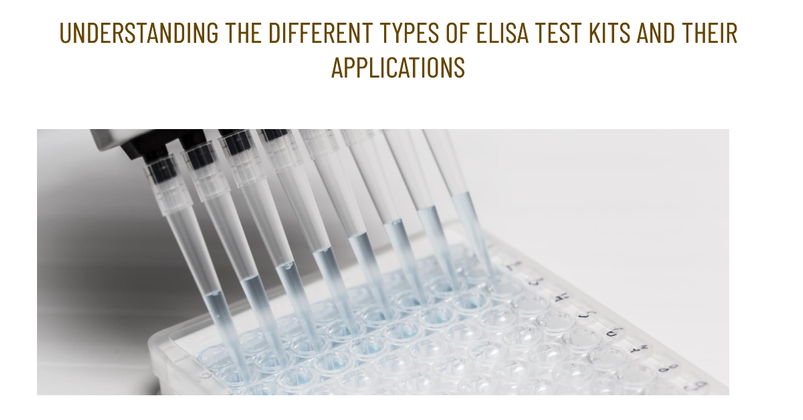Understanding The Different Types Of ELISA Test Kits And Their Applications
Nov 1st 2023
Enzyme-linked immunosorbent Assay, often called ELISA, is a widely used biochemical method for identifying and measuring particular proteins, antibodies, antigens, and other substances in biological samples. ELISA kits are offered in different varieties, each created for precise purposes and adapted to the requirements of scientists and specialists.
This extensive article will investigate the various ELISA examination kits accessible and their varied uses in healthcare, research, and diagnosis.
What is ELISA?
Enzyme-linked immunosorbent Assay (ELISA) is a flexible and broadly utilized laboratory method that performs a central function in multiple areas, such as immune system study, medical testing, and biomedical investigation.
This advanced test uses the basics of immune response and cellular biology to identify and measure particular substances in biological specimens, making it an essential instrument for comprehending diverse bodily functions and identifying illnesses.
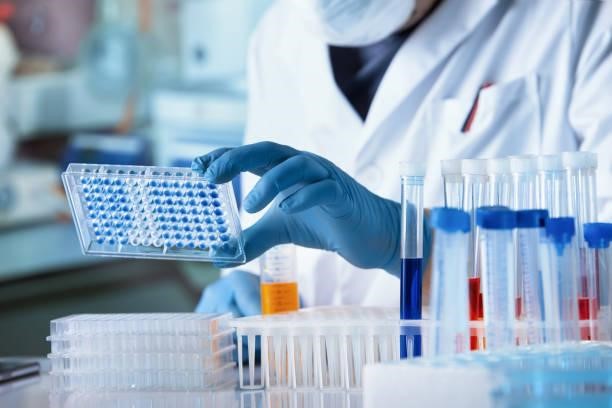
The core idea of ELISA relies on the extremely particular linking interaction between antigens and antibodies. Antigens are substances or molecular forms, such as proteins, small proteins, hormones, or even disease-causing agents like viruses or bacteria, that provoke an immune reaction in the body.
Antibodies, conversely, are specialized proteins created by the immune system to identify and counteract these antigens. In the ELISA context, Custom Antibodies are employed to pinpoint and attach with strong attraction to the desired antigen.
The Importance of ELISA in Research and Diagnosis
The enzyme-linked immunosorbent assay (ELISA) has become an essential instrument across various scientific areas, including medical study, medical testing, drug development, and environmental tracking. Its unmatched precision, selectivity, and adaptability have firmly set it as a fundamental element in recognizing and measuring various important biomolecules.
These consist of proteins, hormones, immune agents, and disease-causing agents. ELISA test kits and the knowledge of the various sorts of ELISA test kits are crucial aspects of contemporary scientific exploration and healthcare progress.
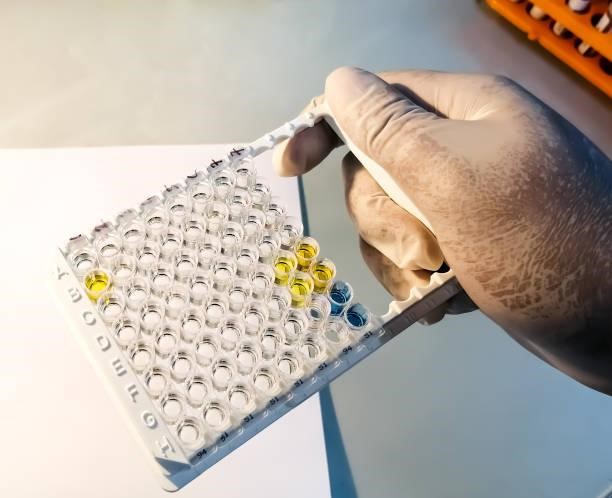
In the domain of ELISA applications, the importance of this method cannot be emphasized enough. In medical investigation, ELISA performs a central function in disclosing the complexities of different illnesses, helping researchers find new indicators, and deciphering disease processes. Additionally, medical tests depend heavily on ELISA assessments. ELISA diagnostic kits serve as essential tools for identifying and overseeing particular illnesses, like HIV and, more recently, COVID-19, thanks to the development of COVID-19 ELISA kits.
In drug development, ELISA is a strong ally, aiding drug exploration and assessment by examining the connections between potential medicines and their intended substances. It clears a path for accurate therapy and speeds up the process from the lab bench to patient treatment.
Types of ELISA Test Kits
ELISA examination kits are available in various forms, each created to match particular research or diagnostic requirements. The selection of ELISA kind relies on factors such as the aimed molecule, specimen kind, and required precision. Here are the four primary sorts of ELISA examination kits:
-
Direct ELISA
Direct ELISA kits, a basic version of the flexible enzyme-linked immunosorbent assay (ELISA), perform a crucial function in numerous scientific uses and clinical testing. This simple but effective method is mainly used to detect the existence of particular antigens in a provided specimen, rendering it an essential part of various ELISA examination kits created for this objective.
In an Immediate ELISA test, the process begins by applying a microplate well with capturing antibodies. These selected antibodies are carefully chosen for their preciseness regarding the desired antigen. After the well is coated, it transforms into a fixed surface that directly attaches to the antigen found in the sample.
This method's unique aspect is the inclusion of an enzyme-linked antibody into the well. This enzyme-linked antibody, also known as a detection antibody, is designed to identify and attach to the same target antigen. This connection sets off a series of responses involving the enzyme, eventually producing a detectable indication.
This indication, frequently appearing as an alteration in color, is directly related to the amount of the aimed antigen in the specimen, permitting its measurement.
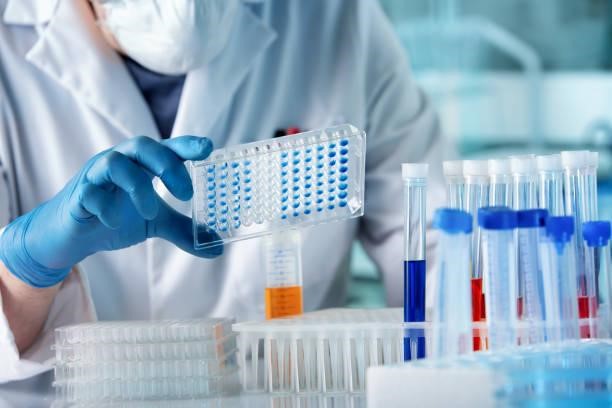
-
Indirect ELISA
Roundabout ELISA, another valuable version of the versatile enzyme-linked immunosorbent assay (ELISA), serves a different function in scientific studies and medical testing. This technique is cleverly designed to spot immune agents within a provided specimen, rendering it an essential part of diverse ELISA examination kits customized for this precise use.
Unlike the Immediate ELISA, which is tailored for antigen spotting, the Indirect ELISA tactic follows an alternate route. It employs a capturing antigen fixed on a sturdy foundation, like a microplate well. This capturing antigen has a particular liking for the antibodies that might be there in the specimen.
The subsequent phase includes adding an enzyme-linked secondary antibody into the well. This secondary antibody is carefully crafted to identify and attach to the initial antibodies previously stuck to the capturing antigen. This secondary antibody acts as a connection between the initial antibodies and the enzymatic signal-producing mechanism.
-
Sandwich ELISA
Sandwich ELISA, a potent form of the adaptable enzyme-linked immunosorbent assay (ELISA), has gained enormous fame for its outstanding acuteness and skill in spotting and gauging antigens, especially in intricate biological specimens. This advanced approach banks on a tactical combination of two extremely precise antibodies, a fundamental idea distinguishing it in ELISA methods.
The sandwich ELISA kits procedure starts with fixing one of the distinct antibodies onto a firm base, like a microplate well. This secured antibody is precisely picked for its capacity to catch the aimed antigen precisely. Like making a molecular sandwich, a second antibody is inserted and attached to an enzyme. This auxiliary antibody identifies and adheres to a separate identifying mark on the same intended antigen.
The clever plan behind the Layered ELISA produces a 'sandwich' arrangement, where the antigen is enclosed between the two antibodies, one secured and the other enzyme-linked. This twofold recognition system boosts the precision and sharpness of the test, as the indication produced is precisely connected to the amount of the antigen in the specimen.
Besides the method, cutting-edgetechnologies and offerings like Peptide Synthesis, Gene Synthesis, Antibody Sequencing, Custom Antibody, Protein Expression Service, and Protein Production Service have additionally increased the abilities of Layered ELISA.
These offerings simplify the creation of exact and personalized antibodies, enhancing the Layered ELISA's flexibility and customization for the distinct requirements of investigation and testing.
-
Competitive ELISA
Rival ELISA is used when gauging the amount of a tiny substance, like hormones or medications, in a specimen. In this test, the model is combined with an enzyme-marked version of the substance (competing substance) and put into a plate covered with antibodies against the intended meaning.
The quantity of competing substances linked to the antibodies is opposite to the amount of the essence in the specimen.
Applications of ELISA Test Kits
ELISA test kits find applications in various fields due to their versatility and precision. Here are some of the key applications:
1. Medical Diagnostics
Medical diagnostics depend significantly on the adaptability and accuracy of ELISA as a vital instrument in spotting and gauging particular indicators connected to a broad spectrum of illnesses. This priceless method has become crucial in collecting diagnostic approaches employed by healthcare experts to detect and oversee different healthcare issues.
One of the most remarkable uses of ELISA in healthcare testing is its central part in spotting and diagnosing HIV (Human Immunodeficiency Virus) infection. ELISA assessments involving HIV ELISA kits find HIV-unique antibodies in a patient's bloodstream. This essential examination technique aids in recognizing individuals who might have encountered the virus, permitting prompt action and patient treatment.
Likewise, regarding contagious ailments, ELISA is vital in identifying hepatitis, encompassing both hepatitis B and C. ELISA examinations can locate substances and immune agents linked to these viruses, helping in the prompt spotting of infections and directing treatment choices.
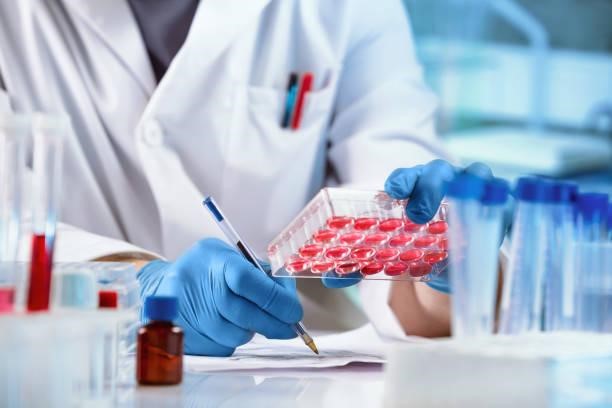
2. Infectious Disease Detection
Spotting contagious diseases stands out as one of the prime uses of ELISA, demonstrating its central part in protecting public well-being and epidemiological oversight. This advanced method is broadly used to pinpoint disease-causing agents, including bacteria and viruses, in patient specimens.
Its benefits reach much further than individual patient treatment, serving as a vital element in observing epidemics and strengthening the combined strength of societies and countries against contagious diseases.
3. Allergy Testing
Allergy assessment signifies one more vital use of ELISA, pivotal in evaluating and diagnosing allergies, permitting healthcare experts to propose precise treatment approaches to affected persons. ELISA excels at measuring allergen-dedicated antibodies, called IgE antibodies, in patient blood, offering priceless information regarding allergic susceptibilities and directing individualized treatment schemes.
In allergy testing, ELISA tests are customized to spot and gauge allergen-uniqueIgE antibodies found in a patient's bloodstream. The immune system generates these antibodies after encountering allergens, which are substances provoking allergic responses. By quantifying the quantities of allergen specificIgE antibodies, medical experts can pinpoint the exact allergens that cause sensitivity in a patient.
4. Cancer Biomarker Detection
Cancer marker recognition is another critical area where ELISA has become a fundamental method. It performs a central part in spotting and measuring particular molecules linked to cancer, like prostate-specific antigen (PSA) and carcinoembryonic antigen (CEA), supplying priceless information for cancer detection, prediction, and tracking the efficacy of treatment.
In cancer testing, ELISA is designed to pinpoint and quantify the quantities of particular cancer indicators found in patient specimens, like blood or tissue. These indicators can involve proteins, substances, or other molecular components that signify cancerous expansion or the advancement of the illness.
Choosing the Right ELISA Test Kit
-
Considerations for Selection
When scientists and medical testers must pick a fitting ELISA examination kit, numerous crucial deliberations are involved. These deliberations cover an extensive assortment of aspects that, as a whole, establish the appropriateness of specific equipment for a certain research or diagnostic purpose. Among these deliberations, precision, specimen kind, aimed substance, price, simplicity, and tool accessibility are vital.
Sensitivity and specificity are foundational attributes of an ELISA test kit. Sensitivity pertains to the kit's capacity to find small amounts of the aimed substance precisely. A greatly sensitive kit is crucial when dealing with specimens where the aimed substance might exist in tiny quantities.
Specificity, conversely, guarantees that the kit precisely detects the aimed substance within a complex mix of other substances. This is notably important in preventing incorrect positive and negative outcomes in diagnostic uses.
The target molecule is a pivotal determinant. ELISA kits are customized to identify distinct biomolecules, such as proteins, small proteins, hormones, immune agents, and substances that trigger immune responses. Scientists and medical testers must pick a kit that suits their intended substance.
Custom ELISA Kits vs. Commercial Kits
While ready-made ELISA kits provideease and established procedures, personalized ELISA kits enable scientists to adapt the test to their particular demands. The selection relies on the distinct prerequisites of the test or diagnostic use.
The ELISA Process
The ELISA procedure is a carefully organized sequence of actions, each vital to acquire precise and consistent outcomes in numerous scientific and diagnostic uses. Whether dealing with ready-made ELISA test kits or individual assessments created through services like Recombinant Antibody production and Recombinant Protein Expression, adhering to a finely tuned set of instructions is crucial for achievement.
During the ELISA procedure, it's vital to adhere to the instructions carefully to guarantee precise and dependable outcomes. Collaboration with specialized services or Antibody Sequencing Companies, Custom Peptide Synthesis Services, and Protein Expression and Purification Servicescan offer access to improved substances and professional advice, boosting the achievement of ELISA-focused trials.
Future Trends in ELISA
As technology progresses, the realm of ELISA persists in developing. Some prominent forthcoming trends encompass:
1. Automation and High-Throughput ELISA
The mechanization of ELISA operations and the creation of systems for handling large quantities of work are predicted to boost effectiveness and diminish human blunders, rendering ELISA even more reachable and functional for various uses.
2. Multiplex ELISA
Multiplex ELISA permits the concurrent identification of several substances within one specimen, improving the effectiveness of biomarker characterization in research and diagnostics.
3. Point-of-Care ELISA
Progress in making ELISA equipment smaller and portable could make point-of-care testing possible, allowing for quick and convenient diagnostic uses beyond standard lab environments.
Conclusion
ELISA examination sets have transformed medical investigation, medical testing, and environmental observation domains. Grasping the various kinds of ELISA and their uses is vital for scientists and medical experts to utilize the complete capacity of this adaptable and effective method. As technology progresses, ELISA will undoubtedly have a more pivotal role in progressing scientific understanding and enhancing medical consequences.
Whether diagnosing illnesses, supervising environmental well-being, or enhancing medication creation, ELISA will remain an irreplaceable instrument in the scientific collection.

